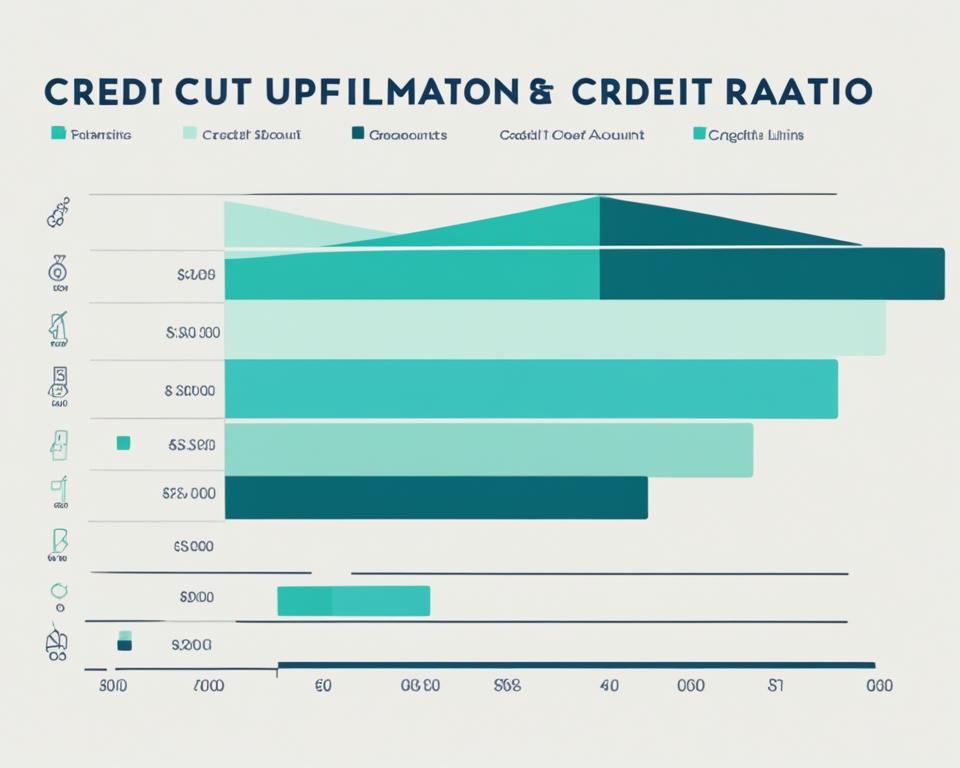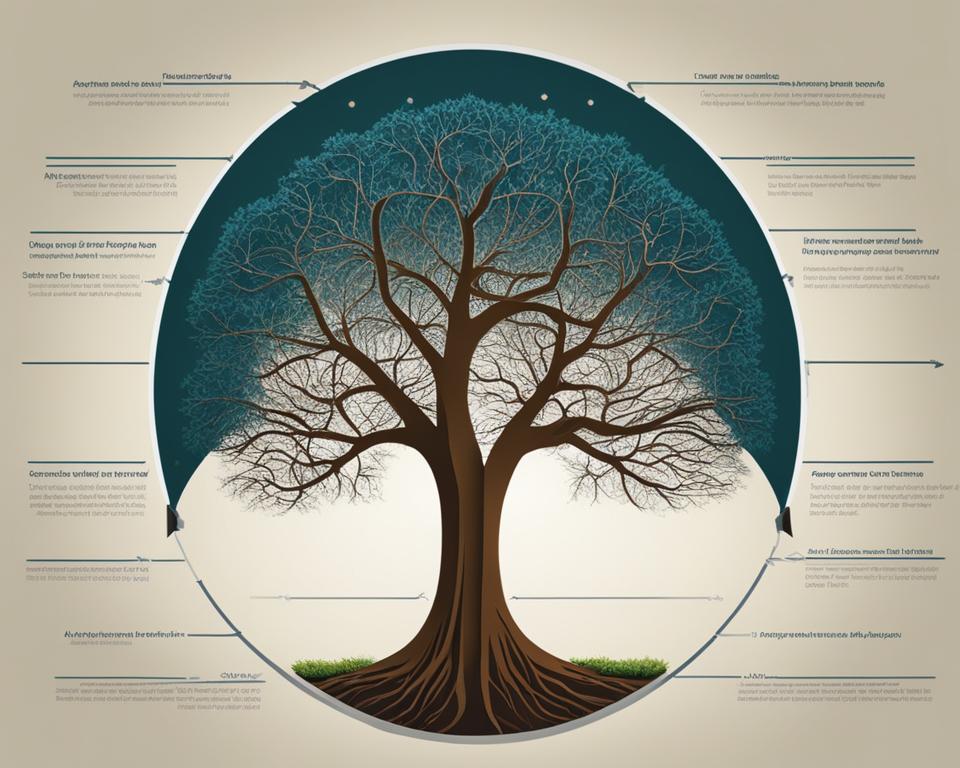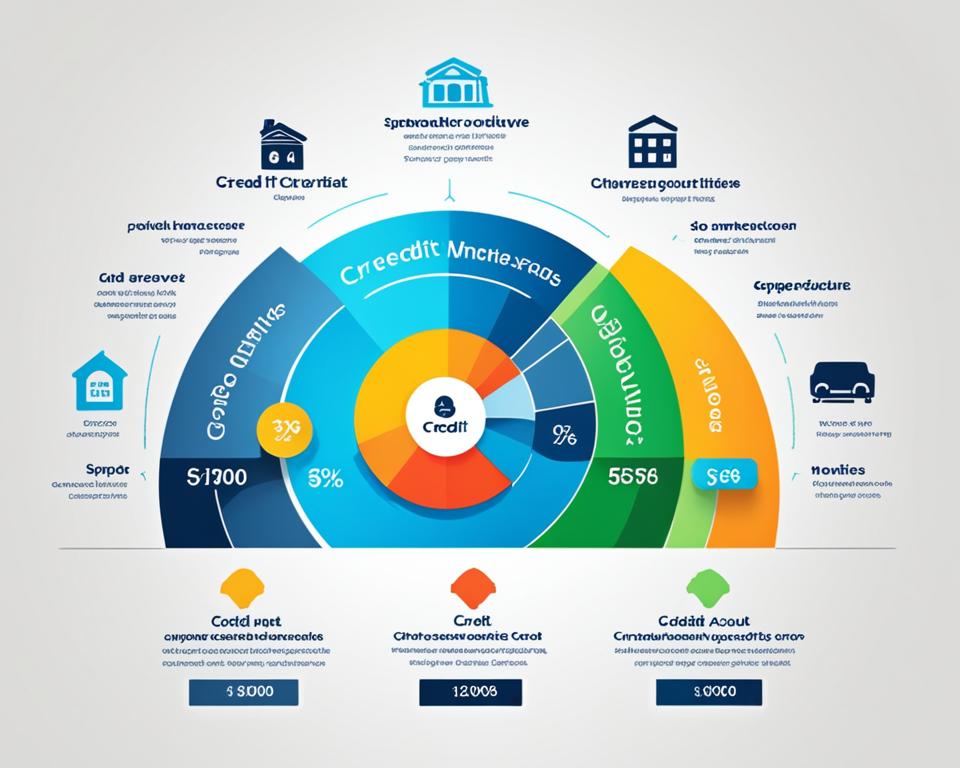Credit repair is an essential step towards financial stability and a healthy credit score. While many individuals focus solely on paying off debts and avoiding late payments, there is another credit repair tip that often goes unnoticed: keeping old accounts open.
In this article, we will explore the importance of maintaining a long credit history and how it contributes to credit score improvement. We will also discuss the benefits of keeping old accounts open and provide best practices for managing them effectively. Let’s dive in and discover how this simple credit repair tip can make a significant impact on your financial life.
- Keeping old accounts open is a valuable credit repair tip that can improve your credit score.
- A long credit history demonstrates responsible credit management and enhances your financial stability.
- Old accounts contribute to a lower credit utilization ratio, positively impacting your credit score.
- Timely payments and responsible credit utilization are crucial for the proper management of old accounts.
- Consider the potential pitfalls and factors to evaluate when deciding whether or not to close an old account.
Key Takeaways:
By understanding the importance of keeping old accounts open and implementing good credit habits, you can take significant strides towards credit repair and long-term financial stability. Let’s now explore the role of credit history and dive deeper into the benefits and best practices associated with this credit repair tip.
The Importance of Credit History
Building and maintaining good credit habits is essential for individuals who want to establish a solid financial foundation. One crucial aspect of credit management that should not be overlooked is the length of credit history. Your credit history reflects how long you have been using credit and provides lenders with valuable insights into your creditworthiness.
Having a long credit history demonstrates that you have been successfully managing credit over an extended period. It allows lenders to assess your creditworthiness based on your past behavior, providing them with a more comprehensive picture of your financial responsibility.
Length of credit history is a significant factor in determining your credit score. The longer your credit history, the more data lenders have to evaluate your creditworthiness accurately. This information helps lenders make informed decisions about extending credit to you.
Building credit takes time and establishing a positive track record. It is not only about your current financial behavior but also about your past payment history. By establishing a long credit history, you demonstrate good credit habits that can positively impact your credit score.
Let’s take a look at the benefits of having a lengthy credit history:
“A long credit history shows lenders that you have a track record of responsible credit management.”
Lenders view individuals with a longer credit history as lower-risk borrowers. They are more likely to trust individuals who have consistently managed their credit obligations over time. As a result, having a long credit history can open doors to favorable interest rates on loans, credit cards with higher limits, and other financial opportunities.
Building and maintaining good credit habits are essential in today’s financial world. By understanding the importance of length of credit history, individuals can take proactive steps to establish and nurture a positive credit track record.
| Benefits of Having a Lengthy Credit History |
|---|
| 1. Higher credit scores |
| 2. Improved chances of loan approval |
| 3. Access to better interest rates |
| 4. Higher credit limits |
| 5. Demonstrated financial responsibility |
The Power of a Good Credit History
A strong credit history goes beyond just a three-digit number. It provides a foundation for financial stability and opens doors to countless opportunities. By responsibly managing credit and maintaining a long credit history, individuals can set themselves up for success.
Benefits of Keeping Old Accounts Open
When it comes to maintaining a strong credit score and establishing financial stability, keeping your old accounts open can offer a range of benefits. By understanding how credit utilization ratio and good credit habits play a crucial role in your financial well-being, you can make informed decisions about managing your credit effectively.
Improved Financial Stability
One of the primary advantages of keeping old accounts active is the improved financial stability it brings. Consistently maintaining these accounts demonstrates a history of responsible credit management, signaling to lenders and creditors that you are a reliable borrower.
“By holding onto your old accounts, you’re showcasing your ability to handle credit responsibly, which can strengthen your financial position,” says Jane Anderson, a financial expert.
In addition, having a long credit history with established accounts can give you a sense of stability and comfort, providing a foundation for future financial endeavors.
Lower Credit Utilization Ratio
Maintaining old accounts also allows you to keep your credit utilization ratio low. Your credit utilization ratio is the percentage of available credit you are currently using. By keeping your old accounts open and active, you increase the available credit limit, effectively lowering your overall utilization ratio.
Here’s an example to illustrate the concept:
| Scenario | Total Available Credit | Total Credit Used | Credit Utilization Ratio |
|---|---|---|---|
| Before keeping old accounts open | $10,000 | $5,000 | 50% |
| After keeping old accounts open | $15,000 | $5,000 | 33% |
In the scenario above, simply keeping old accounts open has reduced the credit utilization ratio from 50% to 33%, which can have a positive impact on your credit score.
By maintaining low credit utilization, you portray yourself as a responsible borrower who effectively manages available credit, positioning yourself for future credit opportunities.
Encourages Good Credit Habits
Keeping old accounts open encourages and reinforces good credit habits. It serves as a reminder to make timely payments, avoid carrying high balances, and manage credit responsibly.
“By keeping old accounts open and using them responsibly, you are building a solid foundation that contributes to good credit habits,” advises David Johnson, a credit specialist.
Additionally, the benefits of consistent, healthy credit habits extend beyond increased creditworthiness. They can positively impact other areas of your financial life, such as securing better interest rates on loans and qualifying for premium credit cards with attractive rewards.
Overall, maintaining your old accounts can provide you with improved financial stability, a lower credit utilization ratio, and an opportunity to develop and reinforce good credit habits. By strategically managing your credit and staying committed to responsible credit management, you can set yourself on a path towards long-term financial success.
How Old Accounts Affect Credit Scores
When it comes to credit score improvement, the length of your credit history plays a crucial role. Building credit takes time, and one factor that contributes significantly to a strong credit profile is the age of your accounts. By keeping old accounts open, you can positively impact your credit score by increasing the length of your credit history and demonstrating responsible credit management.
Having a lengthy credit history is beneficial for several reasons. Firstly, it shows lenders that you have sufficient experience in managing credit over an extended period. This demonstrates your ability to handle financial responsibilities and gives lenders more confidence in your creditworthiness. As a result, it can improve your chances of obtaining loans, mortgages, or credit cards on favorable terms.
Furthermore, the age of your accounts also influences the average age of your overall credit history. A long credit history with a mix of old and new accounts gives a more balanced and established credit profile. Lenders prefer to see a history of responsible credit management over several years, as it indicates stability and reliability.
Keeping old accounts open also has a positive impact on your credit utilization ratio. This ratio compares the amount of credit you’re using to the amount you have available. By maintaining older accounts with higher credit limits, you effectively lower your credit utilization ratio. This demonstrates responsible credit usage and can result in a higher credit score.
It’s important to note that the impact of old accounts on your credit score may vary depending on other factors. For example, if you have a history of missed payments or high levels of debt, the presence of old accounts alone may not be sufficient to improve your credit score. However, when combined with good credit habits, such as making timely payments and keeping credit card balances low, keeping old accounts open can significantly contribute to credit score improvement and building credit.
“By keeping old accounts open, you can positively impact your credit score by increasing the length of your credit history and demonstrating responsible credit management.”
In conclusion, maintaining old accounts can have a beneficial effect on your credit score. The length of your credit history, along with responsible credit management, is fundamental to credit score improvement and building credit. By keeping old accounts open, you showcase your creditworthiness and increase your chances of securing better loan terms and financial opportunities.
| Benefits of Keeping Old Accounts Open: |
|---|
| Increases the length of your credit history |
| Shows responsibility in credit management |
| Improves credit utilization ratio |
| Better loan terms and financial opportunities |
Best Practices for Keeping Old Accounts Open
When it comes to maintaining good credit habits and building financial stability, keeping your old accounts open is essential. Here are some best practices to ensure the proper management of your old accounts:
1. Make Timely Payments
Consistently making on-time payments is crucial for maintaining a positive credit history and demonstrating responsible credit management. Set up automatic payments or reminders to help you stay organized and avoid any late payment penalties.
2. Utilize Credit Responsibly
Responsible credit utilization is another key factor in building and maintaining a good credit score. Keep your credit card balances low and aim to use no more than 30% of your available credit limit. This demonstrates to lenders that you can manage credit responsibly and reduces the risk of accruing overwhelming debt.
3. Monitor Your Accounts
Regularly monitoring your old accounts is essential for safeguarding your financial stability. Keep an eye on your statements, credit reports, and any suspicious activity. Report any unauthorized transactions immediately to your credit card issuer or bank.
4. Consider Credit Limit Increases
If you’ve had your old accounts for quite some time and have demonstrated responsible credit behavior, you may want to inquire about a credit limit increase. This can help lower your credit utilization ratio and improve your credit score.
5. Avoid Closing Accounts Impulsively
While closing unused accounts can sometimes be a good idea, avoid closing your old accounts impulsively. As mentioned earlier, the length of your credit history plays a significant role in your credit score. Closing an old account can shorten your credit history, potentially harming your creditworthiness.
“Keeping your old accounts open and managing them responsibly is a smart financial move that can contribute to your long-term credit health and overall financial stability.”
By following these best practices, you can ensure that your old accounts continue to support your credit repair efforts, contribute to building good credit habits, and provide the foundation for long-term financial stability.
| Benefits | Best Practices |
|---|---|
| Improved Financial Stability | Make timely payments |
| Lower Credit Utilization Ratio | Utilize credit responsibly |
| Longer Credit History | Monitor your accounts |
| Consider credit limit increases | |
| Avoid closing accounts impulsively |
Watch Out for Potential Pitfalls
While keeping old accounts open can be beneficial for credit score improvement, financial stability, and building credit, it’s essential to be aware of potential pitfalls that may arise. By staying informed and proactive, you can navigate these challenges and make informed decisions about your credit management.
Annual Fees
One potential pitfall associated with keeping old accounts open is the presence of annual fees. Some credit cards and financial products may charge an annual fee for maintaining the account, even if it’s not actively used. It’s important to review your accounts regularly and assess whether the benefits of keeping the account open outweigh the cost of the annual fee.
Debt Accumulation
“Credit cards can be tempting, and keeping old accounts open may increase the temptation to accumulate debt,” warns financial expert Jane Smith. “It’s crucial to exercise discipline and responsible credit utilization to avoid falling into a debt trap.”
While having multiple credit accounts can positively impact your credit score, it’s essential to use them responsibly. Keeping old accounts open might increase the availability of credit, which may tempt some individuals to overspend and accumulate debt. Remember to use credit wisely, only charging what you can comfortably repay each month.
Identity Theft Risks
Another potential pitfall associated with maintaining old accounts is the risk of identity theft. If you have accounts that you no longer monitor closely, they may become vulnerable to unauthorized access and fraudulent activity. It’s essential to regularly review your account statements, monitor your credit report, and report any suspicious activity immediately to prevent potential financial damage.
By being aware of these potential pitfalls, you can take proactive steps to mitigate risks and maintain control over your credit score, financial stability, and overall credit-building efforts. However, it’s important to remember that the benefits of keeping old accounts open often outweigh the risks. Through responsible credit management and regular monitoring, you can leverage the potential benefits while safeguarding yourself against potential drawbacks.
Considerations When Closing an Account
When it comes to managing your credit, deciding whether to close an old account requires careful consideration. While there may be valid reasons for closing an account, it’s essential to understand the potential impact on your credit utilization ratio and overall financial stability.
One key factor to consider is the credit utilization ratio, which is the amount of credit you’re currently using compared to your total credit limit. Closing an old account can decrease your available credit and potentially increase your credit utilization ratio. This may have a negative impact on your credit score and make it harder to obtain future credit.
Financial stability is another crucial aspect to take into account. Keeping old accounts open can contribute to your financial stability by maintaining a longer credit history. Lenders often value a longer credit history as it demonstrates your ability to manage credit responsibly over time. It can help establish trust and improve your chances of securing favorable financing options in the future.
“Closing an old account may seem like a simple decision, but it’s important to weigh the potential consequences on your credit utilization ratio and overall financial stability. Keeping old accounts open can provide benefits that contribute to a solid credit foundation.”
Furthermore, maintaining good credit habits is essential for long-term financial success. By keeping old accounts open, you can continue practicing responsible credit management and build a positive credit history. This includes making timely payments and keeping your credit utilization low.
However, it’s important to note that every individual’s financial situation is unique, and there may be valid reasons for closing an old account. If you’re considering closing an account, take the time to evaluate its impact on your credit utilization ratio and overall financial stability. Consider consulting with a financial advisor or credit counselor to assess the potential consequences and make an informed decision.

Pros and Cons of Closing an Old Account
| Pros | Cons |
|---|---|
| Reduces potential for identity theft | May decrease available credit |
| Eliminates annual fees | Can impact credit utilization ratio |
| Simplifies credit management | May shorten credit history |
Conclusion
In summary, keeping old accounts open is a crucial credit repair tip that can lead to improved credit scores and long-term financial stability. By maintaining a longer credit history, you demonstrate your ability to manage credit responsibly, which is highly valued by lenders and credit scoring models.
By keeping old accounts open, you also positively impact your credit utilization ratio, which is another significant factor in determining your creditworthiness. A lower credit utilization ratio shows that you are using a smaller percentage of your available credit, indicating responsible credit management.
Furthermore, keeping old accounts open establishes a solid foundation for building credit. Lengthening your credit history allows you to showcase your credit management skills over an extended period. Lenders appreciate borrowers with a longer credit history, as it provides them with more data to assess your creditworthiness and repayment behavior.
So, if you want to boost your credit score and achieve financial stability, remember this valuable credit repair tip: keep old accounts open. By doing so, you can enjoy the benefits of a higher credit score, better lending opportunities, and a more secure financial future.
FAQ
How can keeping old accounts open help improve my credit score?
Keeping old accounts open can improve your credit score in several ways. First, it increases the length of your credit history, showing potential lenders that you have a long track record of responsible credit management. Second, it contributes to your credit utilization ratio, which is the amount of credit you’re using compared to your total available credit. By keeping old accounts open and maintaining a low balance, you can lower your credit utilization ratio and boost your credit score.
What are the benefits of keeping old accounts open?
Keeping old accounts open offers several advantages. It provides financial stability by showing a consistent credit history and responsible credit management. It also helps maintain a low credit utilization ratio, which is a key factor in determining your credit score. Additionally, keeping old accounts open allows you to continue building a positive credit history and establishes good credit habits.
How do old accounts affect credit scores?
Old accounts can have a positive impact on your credit score. They contribute to the length of your credit history, which accounts for 15% of your credit score. The longer your credit history, the better it reflects your ability to manage credit responsibly. By keeping old accounts open and demonstrating a history of on-time payments, you can improve your credit score and build a solid credit foundation.
What are some best practices for keeping old accounts open?
To ensure the proper management of your old accounts, it’s essential to practice good credit habits. Make timely payments on all your accounts to maintain a positive payment history. Keep your credit utilization low by using your credit responsibly and avoiding maxing out your available credit. Regularly review your account statements for any discrepancies or fraudulent activities. Finally, periodically check your credit report to ensure its accuracy.
Are there any potential pitfalls to keeping old accounts open?
While keeping old accounts open can provide numerous benefits, there may be potential pitfalls to consider. Some old accounts may charge annual fees, so it’s important to weigh the costs versus the advantages. Additionally, having open accounts with available credit may tempt you to accumulate more debt. It’s crucial to practice responsible credit management and avoid overspending.
What factors should I consider when deciding whether or not to close an old account?
Several factors should be considered when deciding whether or not to close an old account. First, consider the impact on your credit utilization ratio. Closing an old account could increase your overall credit utilization, potentially lowering your credit score. Second, evaluate the account’s benefits, such as rewards or low interest rates, to determine if they outweigh any potential negatives. Finally, assess your overall financial stability and whether closing the account aligns with your long-term financial goals.
What is the importance of keeping old accounts open for credit repair and financial stability?
Keeping old accounts open is an important credit repair tip that can improve your credit score and provide long-term financial stability. It helps to establish a positive credit history and demonstrates your ability to manage credit responsibly over time. By keeping old accounts open, you can build a solid credit foundation and improve your chances of securing favorable loan terms and interest rates in the future.





